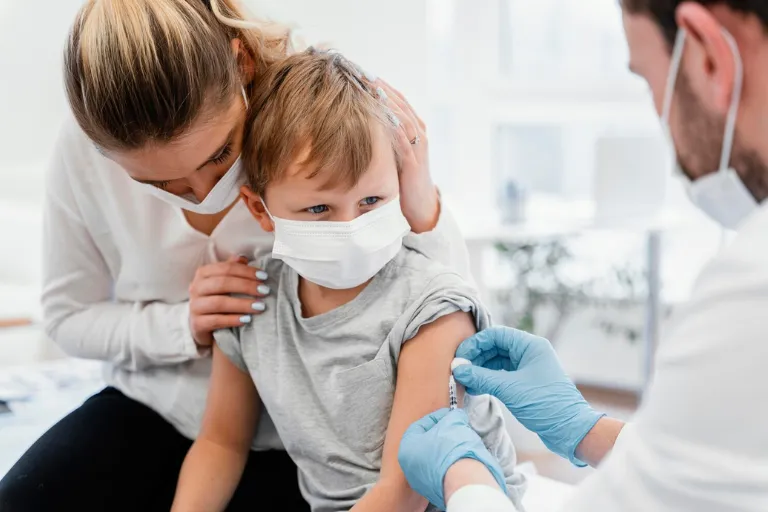Key Points:
- A delayed vaccination schedule postpones or spaces out shots beyond official recommendations.
- Parents may choose it for safety concerns, autonomy, or fear of “too many shots at once.”
- Research shows no measurable health benefits to delaying vaccines, but significant risks for both children and communities.
- Consulting a licensed health professional is critical before making decisions about timing.
A Debate with Real-World Consequences
What happens when a child’s vaccines don’t follow the recommended timeline? For some parents, delaying feels like a safer, more thoughtful choice—offering them greater control and reassurance in a process that can feel overwhelming. Others see it as a way to protect their child from what they perceive as “too many shots, too soon.”
Yet, as recent outbreaks of measles, whooping cough, and other preventable diseases remind us, the decision to delay vaccination carries serious consequences that ripple beyond individual families. The timing of vaccines is not just a matter of preference—it is a public health issue that affects community protection, disease spread, and the safety of the most vulnerable.
Why the Timing of Childhood Vaccines Matters More Than You Think
Vaccines remain one of the most effective public health solutions in history, preventing millions of deaths and eradicating diseases like smallpox. But timing is critical. The recommended childhood vaccine schedule is designed based on years of research into when children are most vulnerable and when their immune systems respond best.
Delaying vaccines extends the period in which children remain susceptible to infections. For example, infants who postpone the pertussis (whooping cough) vaccine are left unprotected against a disease that can cause life-threatening complications during the first year of life.
Parental Motivations: Why Some Families Consider Delayed Schedules
For parents who choose to delay, motivations often include:
- Concerns about side effects. Some fear that multiple vaccines in one visit might overwhelm a child’s immune system.
- Desire for autonomy. Adjusting the schedule can feel like reclaiming agency in a healthcare system that sometimes feels rushed or impersonal.
- Misinformation and mistrust. Online anecdotes, personal stories, and social media communities often overshadow scientific research, fueling hesitancy.
These concerns, while understandable, can inadvertently increase risks. A delayed schedule may seem safer, but it leaves children unprotected during their most vulnerable stages.
Health Risks of Postponing Vaccines: What the Evidence Shows
The dangers of delaying vaccination are well-documented. Research shows that children on delayed schedules are more likely to contract preventable illnesses like measles, mumps, and chickenpox. These diseases are not just uncomfortable—they can lead to serious complications, hospitalisations, and, in rare cases, death.
On a broader scale, vaccine delays weaken herd protection. When large numbers of children remain unvaccinated or partially vaccinated, communities face increased risk of outbreaks, threatening infants, older adults, and those with chronic symptoms who cannot be vaccinated themselves.
The Science Behind Vaccine Timing and Immune System Readiness
A common misconception is that infants’ immune systems can’t handle multiple vaccines at once. In reality, the immune system encounters thousands of antigens daily—from food, dust, and microbes in the environment. The small number of antigens in vaccines is minimal by comparison.
The official vaccine schedule is not arbitrary—it’s designed based on the age when children are most at risk and when the immune system can mount the strongest response. Delaying shots disrupts this balance, providing no added safety while extending vulnerability.
Are There Any Benefits to Delaying Vaccines? Separating Fact from Perception
Some parents feel that spacing out vaccines helps them monitor reactions more closely or reduces stress for their child. While this perception is valid from an emotional standpoint, scientific evidence shows no measurable health benefits to delaying vaccines.
In fact, the risks outweigh the perceived advantages. Studies show that families who start with a delayed schedule are less likely to complete the full course of vaccines, further lowering protection.
Practical Guidance: How to Navigate Vaccine Concerns with Confidence
Parents deserve open, compassionate dialogue about vaccines—not dismissal or judgment. If you’re considering a delayed schedule, here are practical steps:
- Seek reliable information. Consult resources from the CDC, WHO, and your local health authority.
- Ask your health professional directly. Share your concerns honestly and request evidence-based explanations.
- Focus on local risks. Disease outbreaks vary by region—delaying in a high-risk area may carry even greater consequences.
- Explore comfort strategies. Numbing creams, distraction techniques, and supportive care can ease children’s discomfort during visits.
The Bigger Picture: Community Protection and Public Health Implications
Vaccination is more than a personal decision—it’s a collective safeguard. When schedules are delayed, it not only prolongs the risk for one child but also increases the likelihood of outbreaks that threaten vulnerable groups. The balance between personal choice and public health responsibility is at the core of the vaccine timing debate.
Making an Informed Decision: Balancing Parental Concerns and Medical Expertise
Every parent wants to protect their child. Choosing whether to follow or delay the recommended vaccination schedule is a decision made under the weight of fear, hope, and responsibility. But the evidence is clear: while delaying may feel safer, it introduces new risks without proven benefits.
The best path forward is informed decision-making, grounded in science and supported by a trusted health professional. By weighing both perspectives, families can make choices that safeguard not only their own children but also the health of their communities.
Conclusion
A delayed vaccination schedule may appear to be a cautious alternative, but the science shows it carries more risks than rewards. Postponement ultimately leaves children unprotected at vulnerable ages and weakens community protection. Parents navigating this decision should focus on evidence-based resources, open conversations with health professionals, and a long-term view of both personal and public health.
Your Next Steps
Stay informed. Protect your family. Support your community.
The article does not in any way constitute as medical advice. Please seek consultation with a licensed medical professional before starting any treatment. This website may receive commissions from the links or products mentioned in this article.
Sources
- Reverte V, Zornoza-Moreno M, Molina-Salas YE, Romera-Guirado FJ, Carmen D, Pérez-Martín JJ. Does a correlation exist between delayed vaccination and a decreased vaccine confidence? Human Vaccines & Immunotherapeutics. 2024 Oct 27;20(1).
- Janusz CB, Frye M, Mutua MK, Wagner AL, Banerjee M, Boulton ML. Vaccine Delay and Its Association With Undervaccination in Children in Sub-Saharan Africa. American Journal of Preventive Medicine. 2020 Nov;
- Oyato BT, Abasimel HZ, Lama T, Hussein D, Medina S. Vaccination delay and associated factors among children of age 12-23 months in Gomma district, Oromia, Ethiopia, 2022. Scientific reports [Internet]. 2025;15(1):18461. Available from: https://pubmed.ncbi.nlm.nih.gov/40425743/
- Butler AM, Grabinski VF, Boloker GD, Newland JG, Politi MC. A qualitative study examining pediatric clinicians’ perceptions of delayed vaccine schedules. Vaccine. 2020 Jun;38(30):4740–6.
- Sajwan A, Basu S, Bhatnagar N. Delayed Vaccination in Infants in an Urban Health Center in Delhi, India: Evidence from a Retrospective Audit of Secondary Data. MAMC Journal of Medical Sciences [Internet]. 2020 Jan 1 [cited 2025 Nov 30];6(2):97–7. Available from: https://journals.lww.com/mamc/fulltext/2020/06020/delayed_vaccination_in_infants_in_an_urban_health.4.aspx



